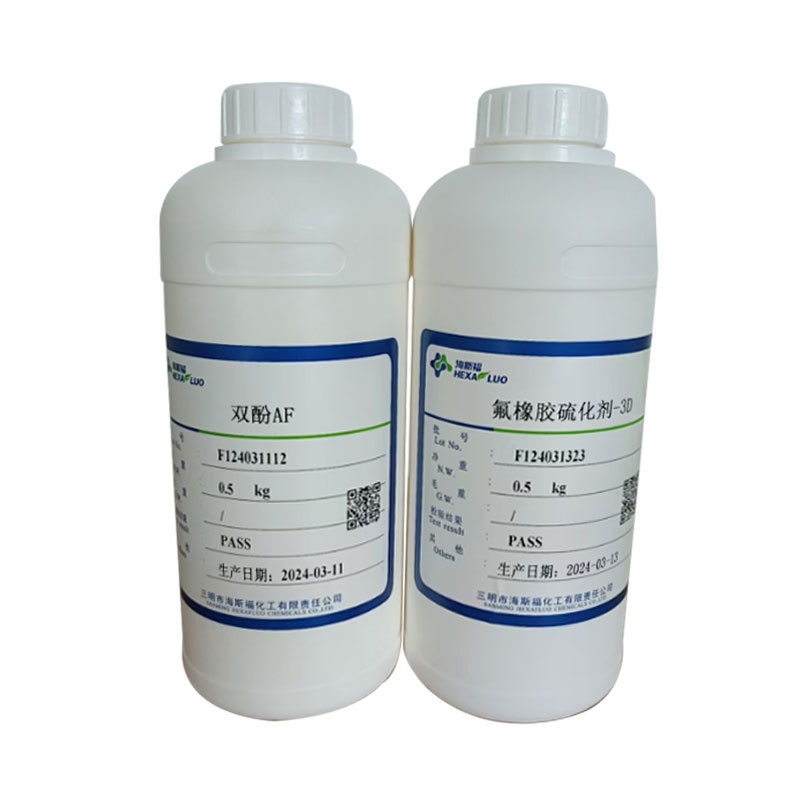newest Rubber Vulcanization Accelerators
Release time:
Apr 27,2025
Source:
Maximize your rubber manufacturing performance with our high-efficiency Rubber Vulcanization Accelerators. Engineered for precision and reliability, these chemical agents accelerate the sulfur vulcanization process, resulting in superior rubber elasticity, resilience, and durability. Our broad portfolio includes thiazoles,
Product Introduction
Bisphenol AF is 2,2-bis(4-hydroxyphenyl)hexafluoropropane. It is mainly used as a vulcanizing agent (crosslinking agent) for fluoroelastomers. Fluoroelastomers vulcanized (crosslinked) with bisphenol AF have low compression permanent deformation, excellent processing safety, storage stability, thermal stability and chemical corrosion resistance, and high tensile strength and tensile strength. At the same time can also be used as a monomer synthesis of fluorine-containing polyimide, fluorine-containing polyester, fluorine-containing polyarylene ether, fluorine-containing polyether ketone, fluorine-containing polycarbonate, fluorine-containing epoxy resin, fluorine-containing polyurethane and other fluorine-containing polymers, used as a gas separation membranes, proton exchange membranes, dielectric coatings, fiber optic sheaths, opto-electronic tubes, substrates, bonding agents and so on, are widely used in the field of microelectronics, fuel cells, optics, space technology.
Fluorine rubber 5 # vulcanizing agent whose chemical composition is hexafluorobisphenol A benzyltriphenylphosphonium salt and bisphenol AF mixture. It is mainly used as a vulcanizing agent (crosslinking agent) for fluoroelastomers. Fluoroelastomers vulcanized (crosslinked) with bisphenol AF have low compression permanent deformation, excellent processing safety, storage stability, thermal stability and chemical corrosion resistance, and high tensile strength and tensile strength.

Maximize your rubber manufacturing performance with our high-efficiency Rubber Vulcanization Accelerators. Engineered for precision and reliability, these chemical agents accelerate the sulfur vulcanization process, resulting in superior rubber elasticity, resilience, and durability.
Our broad portfolio includes thiazoles, sulfenamides, thiurams, and dithiocarbamates, providing versatile options to meet diverse production requirements. These accelerators enable faster curing cycles, improved processing safety, and enhanced product performance, making them essential additives for high-quality rubber goods.
Widely used in tires, conveyor belts, hoses, seals, and molded products, our Rubber Vulcanization Accelerators offer excellent scorch control and ensure uniform cross-linking throughout the rubber matrix. With consistent quality and technical support, we help our customers achieve optimal formulation designs and production efficiency. Trust our accelerators to bring out the best in your rubber products.
Related news
Exploring the Benefits of Oil-Resistant Rubber: A Key Component in the Chemical Industry
Rubber with good oil resistance is a specialized material that has become increasingly important in the chemical industry, particularly in applications where exposure to oils, fuels, and other hydrocarbon-based substances is common. The unique properties of this type of rubber make it an ideal choice for various industrial applications, including seals, gaskets, hoses, and other components. One of
How Low Temperature Resistant Rubber Enhances Product Durability
How Low Temperature Resistant Rubber Enhances Product Durability Table of Contents 1. Introduction to Low Temperature Resistant Rubber 2. Understanding Low Temperature Resistance 3. Key Properties of Low Temperature Resistant Rubber 3.1 Flexibility at Low Temperatures 3.2 Chemical Resistance 3.3 Aging and Weathering Properties 4. Common Applications of Low Temperature Resistant Rubber 4.1 Automoti
Understanding Low Temperature Resistant Rubber: Properties and Applications
Low temperature resistant rubber is a unique type of elastomer designed to maintain its performance and structural integrity in extremely cold environments. As temperatures drop, many conventional rubber materials can become brittle, lose flexibility, and ultimately fail in their intended applications. Low temperature resistant rubber, however, is formulated to withstand these harsh conditions, ma
newest Rubber Vulcanization Accelerators
Maximize your rubber manufacturing performance with our high-efficiency Rubber Vulcanization Accelerators. Engineered for precision and reliability, these chemical agents accelerate the sulfur vulcanization process, resulting in superior rubber elasticity, resilience, and durability. Our broad portfolio includes thiazoles,
Exploring the Benefits of Low Temperature Resistant Rubber in Harsh Environments
Exploring the Benefits of Low Temperature Resistant Rubber in Harsh Environments Table of Contents Introduction to Low Temperature Resistant Rubber Key Properties of Low Temperature Resistant Rubber Applications of Low Temperature Resistant Rubber in Various Industries Advantages of Using Low Temperature Resistant Rubber Comparison with Other Rubber Types Manufacturing Pro
Understanding IIR for Pharmaceutical Stoppers: Enhancing Safety and Efficacy
In the pharmaceutical industry, the packaging and sealing of medications play a crucial role in maintaining product integrity. One of the key materials utilized in this area is Isobutylene-Isoprene Rubber (IIR), commonly known for its exceptional barrier properties and chemical resistance. IIR is particularly significant when it comes to producing pharmaceutical stoppers, which are essential for m

